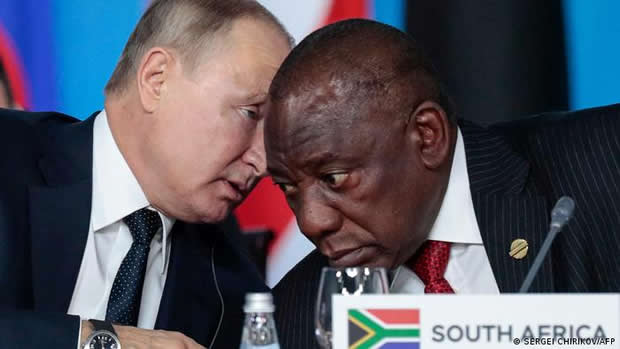
South Africa’s President Cyril Ramaphosa said that any attempt to arrest Russian President Vladimir Putin when he visits the country next month would be a declaration of war with Russia.
Ramaphosa said in court papers that were released on Tuesday that “Russia has made it clear that arresting its sitting President would be a declaration of war.”
Putin has been invited to a BRICS summit in Johannesburg next month but is the target of an International Criminal Court arrest warrant – a provision that Pretoria as an ICC member would be expected to implement were he to attend.
South Africa’s diplomatic dilemma is playing out in court, where the leading opposition party, the Democratic Alliance (DA), is trying to force the government’s hand and ensure the Kremlin leader is held and handed over to the ICC if he steps foot in the country.
In his response, Ramaphosa described the DA’s application as “irresponsible” and said national security was at stake. According to the president, South Africa is seeking an exemption under ICC rules based on the fact that enacting the arrest could threaten the “security, peace and order of the state”.
“It would be inconsistent with our constitution to risk engaging in war with Russia,” he said, adding that this would go against his duty to protect the country.
The arrest would also undermine a South African-led mission to end the war in Ukraine and “foreclose any peaceful solution”, Ramaphosa wrote.
The ICC treaty states that a member country should consult the court when it identifies problems that may impede the execution of a request, and that the court may not proceed with requesting an arrest if this would require a state to break international rules on diplomatic immunity.
‘Flimsy’ argument
South Africa is the current chair of the BRICS group, a gathering of economic heavyweights that also includes Brazil, Russia, India and China, which sees itself as a counter-balance to Western economic domination.
Putin is sought by the ICC over accusations that Russia unlawfully deported Ukrainian children.
South African Deputy President Paul Mashatile has said in recent interviews with local media the government has been trying to persuade Putin not to come – but so far unsuccessfully.
Signed in June and initially marked as “confidential”, Ramaphosa’s affidavit was published on Tuesday, after the court ruled it be made public.
DA leader John Steenhuisen praised the court’s decision, describing Ramaphosa’s argument that South Africa risked war with Russia as “farcical” and “flimsy”.
“When foreign policy decisions have the capacity to decimate South Africa’s international reputation … and decimate our economy, it is crucial that government uphold its obligation to be open and transparent,” Steenhuisen said in a statement.
South Africa has strong economic and trade relations with the United States and Europe.
Trade with Russia is much smaller, but Pretoria has ties with Moscow dating back decades, to when the Kremlin supported the governing African National Congress party in its struggle against apartheid.
Last month, Ramaphosa led a seven-country African peace delegation including representatives from Egypt, Senegal and Zambia, to talks in Kyiv and Saint Petersburg.
Commenting on the affidavit on the sidelines of Nelson Mandela Day celebrations in the late leader’s birthplace of Qunu, Ramaphosa described the case as involving “intricate diplomatic issues”.
Source: News Agencies























